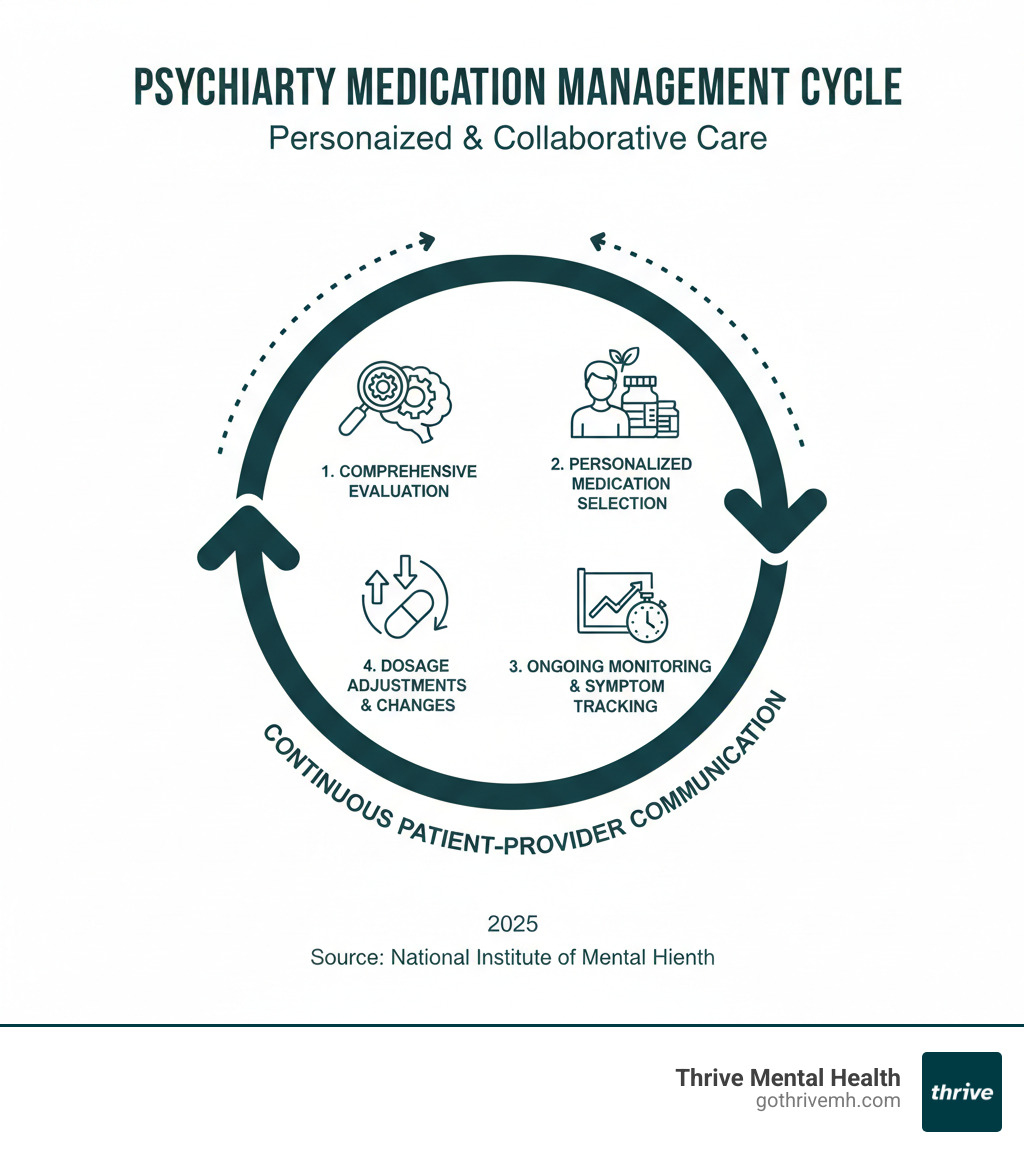Medication Management Pros: Top Psychiatry Providers Reviewed

Why Finding the Right Psychiatry Medication Management Provider Changes Everything
If you or someone you know is struggling or having thoughts of suicide, call or text the 988 Suicide & Crisis Lifeline at 988 or chat at 988lifeline.org. In life-threatening situations, call 911.
Medication Management Pros: Top Psychiatry Providers Reviewed
Psychiatry, Medication Management is the ongoing process of prescribing, monitoring, and adjusting medications to treat mental health conditions like depression, anxiety, bipolar disorder, and ADHD. It’s not just about getting a prescription—it’s about finding the right medication, at the right dose, with the right support to help you feel better and function fully.
If you’re searching for a medication management provider, here’s what you need to know:
- Who can prescribe: Psychiatrists (MD/DO), Psychiatric Nurse Practitioners (PMHNP), and Physician Assistants (PA-C) with psychiatric training
- What to expect: Initial evaluation, personalized medication selection, ongoing monitoring, and regular adjustments
- Treatment timeline: Some medications work within days; others take 4-8 weeks. Follow-up appointments typically occur every 1-3 months
- Telehealth availability: Most providers offer virtual appointments for convenience, though controlled substances may require in-person visits
- Insurance coverage: Most major plans (Cigna, Aetna, Optum, Florida Blue) cover psychiatric medication management
For many in Florida, the struggle to find the right provider is real—someone who listens, adjusts treatment when needed, and treats you as a partner in your care. About 20% of U.S. adults experience mental illness each year, yet only half receive treatment. Long wait times, impersonal care, and confusion about what medication management actually involves keep too many people from getting help.
The truth is, medication management works best when it’s personalized and collaborative. It’s not a one-size-fits-all prescription. It’s a process that requires a provider who understands your symptoms, your life, and your goals—and who adjusts treatment as you go.
As Anna Green, LMHC, LPC, and Chief Clinical Officer at Thrive Mental Health, I’ve spent years helping people steer Psychiatry, Medication Management alongside intensive outpatient (IOP) and partial hospitalization (PHP) programs. I’ve seen how the right medication, paired with therapy and support, can help people reclaim their lives—and how the wrong fit, or lack of ongoing monitoring, can leave people stuck and frustrated.

Psychiatry, Medication Management terms explained:
Your Comprehensive Guide to Psychiatric Medication Management
Psychiatry, Medication Management is a specialized outpatient treatment covering the entire journey of using psychiatric medications. It includes the initial evaluation, prescription, and ongoing medical monitoring by a qualified prescriber. This collaborative process is crucial for psychiatric treatment.
The goal is to ensure medications are effective, safe, and custom to your needs. We aim to reduce symptoms, minimize side effects, and improve your quality of life, helping you engage more fully in daily activities.
What is Psychiatric Medication Management and Why Does It Matter?
Psychiatric medication management is an ongoing partnership with your provider to find the right medication and dosage for you. It’s a personalized journey, not a one-time prescription, designed to help your brain chemistry work with you, not against you. By considering your unique symptoms, medical history, and lifestyle, your provider helps restore balance to neurotransmitters like serotonin and dopamine, so you can feel more like yourself.
The Core Goals: Symptom Relief and Improved Well-being
The primary goal is to help you feel better and live the life you want. This means reducing symptoms that hold you back, such as the weight of depression, the buzz of anxiety, or the mood swings of bipolar disorder. Key objectives include:
- Stabilizing mood: Making emotions more manageable.
- Reducing anxiety: Calming the body’s fight-or-flight response.
- Improving focus: Helping you concentrate on work, relationships, and personal interests.
- Restoring function: Getting back to daily routines, work, and healthy relationships.
- Achieving remission and preventing relapse: Minimizing symptoms for the long term.
Medication also makes other treatments, like therapy, more effective. When symptoms are under control, you can better engage in developing coping skills. For more on this, see The Benefits of Utilizing Mental Health Services.
Who Can Benefit from Medication Management?
Medication management can be life-changing for individuals with moderate to severe symptoms that interfere with daily life, especially if therapy alone isn’t enough. It is often effective for:
- Depression: Major depressive disorder, persistent depressive disorder.
- Anxiety Disorders: Generalized anxiety, panic disorder, social anxiety, OCD.
- Bipolar Disorder: Bipolar I, Bipolar II, and Cyclothymia.
- ADHD: Improving focus, organization, and impulse control.
- Other Conditions: PTSD, psychotic disorders, and severe insomnia.
It is also vital for those with safety concerns, such as suicidal thoughts or self-harm urges, providing stabilization while other supports are implemented. If you are in crisis, call or text 988 immediately.
At Thrive Mental Health, we integrate Psychiatry, Medication Management with our virtual intensive outpatient programs to provide comprehensive care.
The Psychiatry, Medication Management Process: A Step-by-Step Guide
Starting Psychiatry, Medication Management is a partnership where you and your provider work together to find what helps you feel better. It’s a personalized journey with clear milestones: a thorough evaluation, finding the right medication, and regular check-ins to fine-tune your treatment.

Step 1: Comprehensive Initial Evaluation
Your first appointment is about gathering the full picture. Your provider will conduct a diagnostic assessment, discussing your symptoms, their severity, and their impact on your life. You’ll also review your medical and family history, as this influences which medications are safest and most effective. Your provider may recommend lab testing to rule out physical causes for your symptoms or suggest further testing like genetic tests. Together, you’ll establish treatment goals that will guide your care.
Step 2: Personalized Medication Selection
Based on your evaluation, your provider will recommend a medication. This decision considers your diagnosis, symptoms, health profile, and personal goals. The conversation will include potential side effects, most of which are mild and temporary. Medications typically start at a low dose and are increased gradually to find the most effective dose with the fewest side effects. Your preferences are key; this is a collaborative decision, and you should feel comfortable with the plan.
Step 3: Ongoing Monitoring and Adjustment
Psychiatric medications often require fine-tuning. Ongoing monitoring is crucial for success. You’ll have regular follow-up appointments to track your progress and discuss any side effects. Dosage changes are normal as your provider works to find the right balance for you. If a medication isn’t working or side effects are problematic, your provider can suggest alternatives. If you decide to stop a medication, you’ll taper off gradually under medical supervision to avoid withdrawal. For any serious side effects, inform your provider and consider reporting them to the FDA MedWatch Adverse Event Reporting Program.
Step 4: The Importance of Patient-Provider Communication
Honest, open communication is the foundation of effective Psychiatry, Medication Management. Be open with your provider about your experiences, both good and bad. Ask questions about your medication, side effects, or anything else you’re unsure about. This is shared decision-making; you are an active participant in your care. Building trust with your provider leads to better outcomes, as problems can be addressed quickly. Taking an active role means understanding your treatment and communicating effectively with your healthcare team.
Key Components of Your Integrated Treatment Plan
Effective mental health care is holistic. Psychiatry, Medication Management is a powerful tool, but it works best as part of an integrated plan that addresses your mind, body, and spirit. While medication helps balance brain chemistry, therapy provides coping skills, and lifestyle changes support overall well-being. It’s not an either/or choice; it’s a customized combination.

Common Types of Psychiatric Medications
Psychiatric medications influence neurotransmitters to regulate emotions, thoughts, and behaviors. Common types include:
- Antidepressants (SSRIs, SNRIs): Used for depression and anxiety. They can take 4-8 weeks to become fully effective.
- Anti-anxiety medications (Anxiolytics): Benzodiazepines offer rapid, short-term relief, while others like Buspirone are for longer-term use.
- Mood Stabilizers (Lithium, Anticonvulsants): Primarily for bipolar disorder and mood swings. Some require blood monitoring.
- Antipsychotics: Used to treat psychosis in conditions like schizophrenia and severe bipolar disorder.
- Stimulants: Prescribed for ADHD to improve focus and reduce impulsivity.
Medication Management vs. Psychotherapy
Psychiatry, Medication Management and psychotherapy (talk therapy) are different but complementary. Medication management, provided by medical professionals, addresses the biological aspects of mental health. Psychotherapy, provided by therapists, helps you develop coping strategies and gain insight. For most people, combining both is the most effective approach. Medication can reduce symptoms enough to make therapy more productive. Learn more by Understanding the Different Types of Mental Health Therapy.
Integrating Medication with IOP/PHP and Other Therapies
At Thrive Mental Health, we integrate Psychiatry, Medication Management into our Intensive Outpatient (IOP) and Partial Hospitalization (PHP) programs. This comprehensive approach ensures medication works alongside individual and group therapy. Medication can stabilize acute symptoms, enabling you to engage more fully in therapy. Our team approach, which includes your prescriber and therapists, also emphasizes lifestyle changes like exercise, sleep, and stress management to support long-term recovery. For more information, see Vital Mental Health Services.
Finding the Right Provider and Navigating Care in Florida
Finding a qualified professional for Psychiatry, Medication Management is a critical step. The right provider listens, involves you in decisions, and adjusts care as your needs evolve. With telehealth and expanded insurance coverage, quality care is more accessible than ever for Floridians.

Who Can Provide Psychiatry, Medication Management Services?
Several types of qualified professionals can prescribe and manage psychiatric medications:
- Psychiatrists (MD/DO): Medical doctors with specialized residency training in psychiatry. They can diagnose, prescribe, and provide therapy.
- Psychiatric Mental Health Nurse Practitioners (PMHNPs): Advanced practice nurses with specialized psychiatric training who can diagnose, prescribe, and provide therapy.
- Physician Assistants (PA-C): PAs with psychiatric qualifications can also prescribe and manage medications, often under a psychiatrist’s supervision.
When choosing, consider their specialization, experience, and communication style to find a good fit.
The Rise of Telehealth in Medication Management
Telehealth has made Psychiatry, Medication Management more convenient and accessible across Florida. Virtual appointments eliminate commutes and waiting rooms, allowing you to get care from anywhere, whether you’re in Miami, Orlando, or a more remote part of the state. These appointments work like in-person visits, using secure video to discuss symptoms and adjust treatment. Learn more about Medication Management Online. Federal and state regulations may require an in-person visit for prescribing certain controlled substances.
Navigating Insurance and Finding Care in Florida
Most major insurance plans, including Florida Blue, Cigna, Aetna, and Optum, cover Psychiatry, Medication Management. It’s important to verify your specific benefits for copays and deductibles. Using in-network providers typically costs less. At Thrive Mental Health, we make this easy—you can verify your insurance in 2 minutes with no obligation.
Thrive Mental Health provides flexible virtual and hybrid IOP/PHP programs throughout Florida, ensuring you can find quality care in your area. With evening options available, our services are designed to fit your life. We accept most major insurance plans, making expert-led medication management accessible to Floridians statewide.
Frequently Asked Questions about Psychiatric Medication Management
How long will I need to be on psychiatric medication?
The duration of Psychiatry, Medication Management is personal and varies. For acute issues, it might be several months to a year. For chronic conditions like bipolar disorder or recurrent depression, long-term treatment may be needed to maintain stability, similar to managing other chronic illnesses. This decision is always collaborative between you and your provider, and you should never stop medication abruptly without their guidance.
Can a psychiatrist prescribe medication on the first visit?
Yes, it’s common for a psychiatrist to prescribe medication on the first visit after a thorough initial evaluation. However, sometimes your provider may want to gather more information, such as lab results, before making a prescribing decision. This ensures they make the most informed and personalized choice for your care.
What’s the difference between a psychiatrist and a therapist for medication?
Psychiatrists and Psychiatric Nurse Practitioners (PMHNPs) are medical professionals who can prescribe, monitor, and adjust psychiatric medications. They focus on the biological aspects of mental health. Therapists (psychologists, counselors, social workers) provide psychotherapy or “talk therapy” to help you develop coping skills, but they cannot prescribe medication. The most effective treatment often combines both: medication management from a prescriber and therapy from a therapist.
Take the Next Step Towards Mental Wellness in Florida
Psychiatry, Medication Management is a powerful tool that, when used collaboratively, can transform your life. Finding the right medication and provider makes all the difference, but we know it’s not always easy. Your concerns about past experiences or side effects are valid and deserve to be heard by a provider who listens.
At Thrive Mental Health, our virtual and hybrid IOP/PHP programs in Florida integrate expert-led medication management with evidence-based therapy. We create a comprehensive plan that addresses your whole life, not just your symptoms. With evening options, you can get the care you need without putting your life on hold.
You don’t have to figure this out alone. Psychiatry, Medication Management works best within a support system that includes therapy, community, and caring providers.
If you’re in crisis right now, please call or text 988. You are not alone, and help is available immediately.
Ready to explore your options? We make it simple for Floridians to get started. You can verify your insurance in 2 minutes—no obligation, no pressure. Our team is here to help you find the right path forward, whether that includes medication management, intensive therapy, or both. You’ve already taken the first step by seeking information. The next one is reaching out—and we’ll be here when you’re ready.